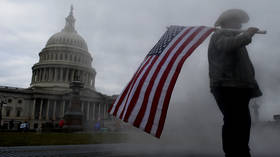Did Jan 6 kick-start the end of US democracy?

In a book to be published next month, Barbara F Walter, a CIA strategic analyst and professor of political science at the University of California, argues that the United States is on the verge of civil war.
In ‘How Civil Wars Start’, Professor Walter states that “no one wants to believe that their beloved democracy is in decline, or headed towards war.”
Nevertheless, she believes that the 6 January Capitol riot was “a pre-cursor to civil war” and “the United States, a democracy founded more than two centuries ago, has entered very dangerous territory.”
Walter’s warning has been echoed by former Bill Clinton adviser and historian Sidney Blumenthal, who said this week that “Trump’s questioning of the election … has led to a genuine crisis of legitimacy.”
At the same time, three retired generals – Paul Eaton, Antonio Taguba and Steven Anderson – stated in an article in the Washington Post, “As we approach the first anniversary of the deadly insurrection at the US Capitol … we are concerned about the aftermath of the 2024 presidential election and the potential for lethal chaos inside our military, which would put all Americans at severe risk … in short, we are chilled to our bones at the thought of a coup succeeding next time.”
These views, disturbing as they are, cannot be easily dismissed. The evidence uncovered recently by the House Select Committee into the January 6 riot makes clear – even at this very early stage of its investigations – that President Trump engaged in an attempted political coup following his election loss in 2020.
Trump pressured Vice President Mike Pence not to certify the election result, and also pressured election officials to falsify results. The 38-page memo prepared by his chief of staff, Mark Meadows, comprises a detailed plan for a coup. And Steve Bannon has admitted he conspired with Trump on how to “kill the Biden presidency” prior to 6 January.
Even Donald Trump Jr. and a number of Fox News journalists urged Trump to condemn the riot, but he refused to do so.
Trump’s coup was only thwarted by the resolute actions of Pence, Attorney-General Bill Barr, Senate minority leader Mitch McConnell, upper-echelon members of the military, and numerous public officials.
Jonathan Karl’s recently published book ‘Betrayal – The Final Act of the Trump Show’ chronicles in dramatic detail the chaos and rank dishonesty that characterized the Trump White House in the aftermath of the lost election.
Karl concludes that “the continued survival of our republic may depend, in part, on the willingness of those who promoted Trump’s lies and those who remained silent to acknowledge they were wrong.”
Unfortunately, there is little sign of that happening at present – even those Republican politicians who despise Trump are unwilling to condemn him publicly, such is the power that he still wields within the party.
It is absolutely clear that Trump supporters – perhaps more than 70 million of them – still do not accept Biden’s election victory, and believe, despite a complete lack of evidence, that the election was “stolen.”
It is a fundamental tenet of liberal democracy that those citizens who support the losing party in an election nevertheless accept the legitimacy of the result. Democracy cannot function otherwise – yet Trump has overturned this basic political principle with apparent ease.
More troubling is the blatant irrationalism exhibited by many Trump supporters. The “stolen election” lie is frankly irrational, as is the refusal to acknowledge Trump’s egregious political duplicity. Karl has justifiably accused Trump of “waging a war on truth.”
More troublingly, this core irrationality makes sensible political debate in America simply impossible, and this fact also points to a crisis of legitimacy within the political system.
In his book ‘Legitimation Crisis’, published in 1973, the German sociologist and philosopher Jurgen Habermas analysed a trend that was emerging within Western democracies. His basic point was that all societies are obliged to legitimize their activities by means of ideologies, and that this was becoming increasingly difficult in the West.
Nevertheless, Habermas believed that human discourse – what he termed in the abstract “undistorted communication” – by definition, entailed objective notions of truth and rationality that placed limits on political activity.
Today, Habermas’ optimistic belief in a necessarily rational basis for politics seems quaint, if not downright quixotic. Contemporary American politics no longer obliges political leaders or parties to justify their policies and actions in rational terms.
That being the case, the fundamental distinction between liberal democracy and authoritarianism, in effect, no longer matters.
It is tolerably clear, then, that American liberal democracy is facing a serious crisis – but that should not come as a surprise.
As Barrington Moore, Jr. pointed out in ‘Social Origins of Dictatorship and Democracy’, published in 1966, liberal democracy is very much the exception, rather than the rule – and industrialization and capitalist economic development, even in the West, can just as easily take place under authoritarian political regimes.
Nazi Germany and pre-World War Two Japan are two examples, and France between the wars could easily have gone the same way.
Nor should it be forgotten that 19th-century liberalism itself was opposed to and fearful of democracy. Even a cursory reading of Alexis de Tocqueville and John Stuart Mill makes this clear – and liberal democracy emerged only fitfully in response to the mass working-class political movements of the late 19th century.
The American founding fathers themselves were, for the most part, reluctant and uneasy democrats. John Adams, for example, was particularly fearful of the ignorance of the masses, saying, “Liberty cannot be preserved without a general knowledge among the people, who have a right and a desire to know.”
In a nation in which millions of voters still believe the 2020 presidential election was stolen, and implicitly condone Trump’s attempted post-election coup – and in which almost all Republican politicians remain cravenly silent on these issues – how can democracy survive?
The complete collapse of American democracy – if it occurs – would obviously have dramatic geopolitical and ideological consequences globally. One very real danger is the possibility that the political leadership of a crisis-ridden United States would seriously contemplate provoking a war with China or Russia in order to “solve” America’s internal problems.
As Barrington Moore, Jr. correctly pointed out – he was writing at the height of the Vietnam War – the primary dynamic of all authoritarian political regimes is “repression at home and aggression abroad.”
Can anyone doubt that Trump would hesitate for one moment to provoke a war over Taiwan or Ukraine in order to attain or hold on to power? In fact, any American leader faced with a serious political crisis of the kind that has recently emerged would be tempted to do the same.
Such a war, of course, would inevitably involve the use of nuclear weapons, and completely destroy the Cold War consensus and peace that has remained in place since the end of World War II.
The complete collapse of American liberal democracy may have very serious consequences indeed – and not just for the United States.
The statements, views and opinions expressed in this column are solely those of the author and do not necessarily represent those of RT.
https://www.rt.com/op-ed/543976-us-civil-war-democracy/



0 Comments:
Post a Comment
Subscribe to Post Comments [Atom]
<< Home